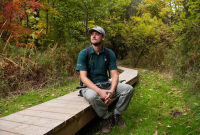Support strong Canadian climate journalism for 2025
During the 2022 Ontario municipal election, Progress Toronto, a third-party campaign and non-profit organization, supported 17 “progressive candidates” running for positions on Toronto city council and the Toronto District School Board (TDSB). Of the 17 candidates the group supported, five councillors and six school trustees were elected.
“We’ve changed the makeup of city council quite significantly. It means there is a mandate now from Torontonians that they want to see change,” Saman Tabasinejad, 29, organizing director at Progress Toronto, said.
Founded in 2018, Progress Toronto’s mandate is to organize for a more democratic, socially just and progressive city, focusing on city council and the school board. The organization runs issue-based campaigns pushing the city for action. It urges city councillors to vote progressively on issues and to pass progressive budgets, policies and motions.
Tabasinejad joined Progress Toronto because she believed in the mission. “All the candidates we supported committed to progressive issues, stances and policies,” Tabasinejad said. “Investing in services, transit, making housing and homes more affordable and committing to voting progressive on city council and the TDSB.”
Tabasinejad was a candidate in the 2018 municipal elections, and despite her unsuccessful campaign, she said city politics can be a positive force in people's lives. Politics and political organizing is a team sport, she noted. “When you run as a candidate, you shouldn’t run alone,” she said.
Progress Toronto has limited resources so it chose the councillors carefully, Tabasinejad said. That list included Amber Morley, Asuma Malik, Alejandra Bravo, Chris Moise and Jamaal Myers, all of whom won.
”We were only in nine wards, which was a strategic decision that had to be made regarding where the open races were so we can help deliver a block of votes that will put a candidate over the edge,” she said.
While the decisions were difficult, Tabasinejad said she’s happy with the results. “We were able to elect a large percentage of our candidates.”
Progress Toronto handpicked knowledgeable progressive candidates in wards held by unpopular conservative councillors where residents were unhappy with their track record.
Morley beat longtime incumbent Mark Grimes, who Tabasinejad calls one of Mayor John Tory’s biggest allies. Ward 5 incumbent Frances Nunziata beat progressive champion Chiara Padovani by less than 100 votes, the closest city council race.
“It’s a big check on John Tory’s power and agenda,” Tabasinejad said. “We hope city councillors realize that their current agenda of cuts and freezes will not cut it for Torontonians, who want action. If they don’t act, we will continue to mobilize their constituents who voted them in, pushing them to take progressive stances.”
Tabasinejad said Progress Toronto’s volunteers knocked on doors, worked the phones and dropped flyers in wards across the city to help get the progressive champions elected.
“We were able to connect with residents and let them know who the progressive choice was, how their incumbents voted and what their track record is so they feel more confident in voting against them,” she said.
While the 2018 municipal election brought a record voter turnout of 60 per cent in Toronto, this time around saw a record low of 29 per cent.
Tabasinejad believes the low turnout is indicative of how people are not engaged with city politics, even though it’s the level of government people have the most direct contact with.
“Constituents have less access to their councillors because Doug Ford slashed city council in 2018,” she said. They are now responsible for wards twice the size they once were, which makes it difficult for candidates to run and equally challenging for constituents to access their city representatives.
“People have real issues they are dealing with,” Tabasinejad said. “The housing crisis, people can’t afford rent, they are getting evicted, inflation, food prices going up, transit delays, road safety. And if we had a government that really delivered on those issues, we would see more people invested.”
Tabasinejad believes that promise is what voters saw in the candidates who were elected. “They were able to mobilize a base, thousands of voters who believe that better is possible, which is a big motivating factor for people to come out and vote.”
Tabasinejad’s message to Toronto’s new council is to address how people in the city are struggling in their daily lives when passing the 2023 budget.
“The city council and the mayor need to do more. These officials will be hearing from us again once city council is back in session,” Tabasinejad said.
Nairah Ahmed / Local Journalism Initiative / Canada’s National Observer






Comments